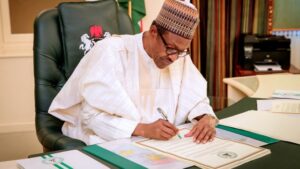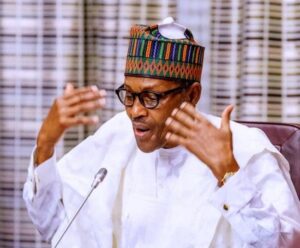A coalition of 127 CSOs under the Joint Action Civil Society Coalition/Nigeria yesterday, petitioned President Muhammadu Buhari to, as a matter of urgency, stop the escalating insecurity in the country or resign.

According to the group, the first quarter of 2021 has witnessed all-time high fatalities and atrocious incidences across the country.
The petition titled ‘State of the Nation: Stop the bleeding, end carnage now, called for the resignation of the President while urging all Nigerians to register their displeasure with the state of affairs across the country by participating in a series of mass actions from May 26, to commemorate the 4th National Day of Mourning and Remembrance of Victims of Mass Atrocities on May 28 and further boycott all Democracy Day activities on May 29, in protest of the deplorable state of insecurity in the country.
The statement reads in part: “Following a sharp increase of 43 per cent in mass atrocities, Nigeria has continued to experience a decline in security across the nation. In the first quarter of 2021 (January to March), we recorded an all-time quarterly high of almost 2,000 fatalities from mass atrocities incidents across the country. Last week, across the six geopolitical zones, there were escalated combustions of violence resulting in even more deaths.
“In our last joint statement issued in February 2021, we had catalogued the assortment of mass atrocities plaguing the country. We had also demanded that where the President fails to fulfil his constitutional duties, that he steps aside, or, that the National Assembly initiates impeachment proceedings against him on grounds of gross misconduct as provided for in Section 143 of the 1999 Constitution of the Federal Republic of Nigeria.
“We are appalled to note that despite our strongly-worded statement, President Buhari’s government has failed to heed our call to fulfil his role as Commander in Chief of the Armed Forces and Nigeria’s democratically elected President. We are therefore left with no other option than to take action to drive home our call to the government and pull the nation back from the path of destruction.”
The group listed among many others failure of the government to include: “Gross injustices by President Buhari’s government against the Nigerian people such that peaceful protesters are threatened and attacked by the government’s security agents while terrorists carrying out mass murder, rape, maiming and kidnapping of Nigerians are feted and granted ‘amnesty, which is tantamount to funding and supporting terrorists, encouraging murder and decimation of gallant troops; terrorist herder attacks on unarmed farming communities and reprisal attacks in the face of government inaction to bring the terrorist herdsmen to justice; large-scale terrorist attacks in the North West irresponsibly tagged by the government as ‘banditry’ in a bid to downplay their criminality; industrial-scale kidnappings across the country; inter-ethnic violence and menace of ethnic militia; and not ending impunity for abuse of power and sectionalism through appointments by balancing the need for competence with the federal character principle.”
Some of the CSOs under the network include: #DoNigeriaRight, Action Aid, Baobab for Women’s Human Rights, Bimbo Odukoya Foundation (BOF), Centre for Democracy and Development (CDD), West Africa, Centre for Human Rights & Civic Education (CHRICED), Civil Society Legislative Advocacy Centre (CISLAC), Connected Development (CODE), Corporate Accountability and Public Participation Africa (CAPPA), Enough is Enough (EiE) Nigeria, Justice for Peace and Development Initiative (JPDI), Legal Defence and Assistance Project (LEDAP) and Nigerian Feminist Forum.
Meanwhile, Nigeria has been advised to tackle its security challenges internally, as they were ‘mere family affairs.’ The Ambassador of South Korea to Nigeria, Kim Young-Chae, who gave the advice in Abuja, held that the insecurity facing the most populous nation was akin to a family disagreement that does not require the intervention of the international community, but regional cooperation.
His words: “Security is a very sensitive issue. I know everyone is concerned about the insecurity in Nigeria but it is Nigeria’s internal issue. It should be discussed among Nigerians. If another country engages Nigeria, that is another issue entirely and that would be considered an international issue. To solve the problem, Nigeria needs international cooperation mainly with its neighbouring countries to enhance its internal security. Nigeria must cooperate with Chad, Niger and other neighbouring countries to ensure cooperation.

The envoy, who stressed the need for the military to be professionalized, described the Army as the center that holds the society together. He went on: “In South Korea, we have a very strong defense which is rated number six in the world. The military is very dedicated and there is little or no corruption in the system. The military is the center that holds the country together. If the military is corrupt, there is a high possibility that the whole country will be corrupt. Discipline and dedication are key in building a stable and efficient military.”
The diplomat said both nations were on the verge of sealing a defense an intelligence-sharing pact. He explained that the Asian country had established the office of a defense attaché in its embassy to strengthen cooperation between the two nations.
Young-Chae further revealed: “To have defense information sharing, both Nigeria and South Korea need to sign some documents. Defense authorities of both countries need to sign the documents which our Defense Attaché is presently working on.
We are going to invite Nigeria’s Minister of Defense to South Korea to concretize this cooperation. “South Korea embassy in Nigeria now has a defense attaché, who has been building relationships in the country. This is the first time South Korea is establishing a defense attaché in a long time in Nigeria. We are making contacts with the Nigerian Army, Navy and Air Force to extend our defense cooperation not only in terms of training and education but intelligence and information sharing, among other defense pacts.”
The ambassador lauded Nigeria’s efforts at curtailing the spread of COVID-19, stating that the African nation was doing all the right things to keep infections low.
Young-Chae, who decried the trade volume between both countries as ‘very low’ at $1.2 billion last year, blamed the development on the free-fall in oil price at the international market and the ‘unfriendly’ nature of Apapa port.